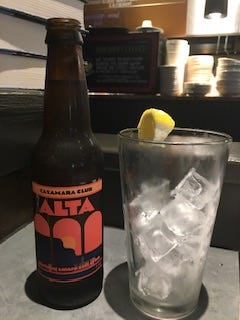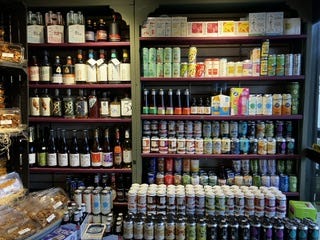Hi from snowy, cold Michigan! We got our first big snowfall of the winter on Friday night. Now, we’re anticipating that temperatures will plunge below zero early in the week. The January cold has become normal for us, and we could have bursts of snow into April. But, I have snow tires on the Prius, my electricity is on, and there is lots to bring you this week.
An events space near me has been advertising a cocktail class they’re calling Gin-uary. Every time it pops into my social media timeline, I think, “Why would they have it this month? Don’t they know it’s Dry January?”
The idea of giving up alcohol after New Year’s dates back more than a decade. It began in 2012 as an initiative by Alcohol Change, UK, a British non-profit. Two years later, it was joined by another British movement, Veganuary, another non-profit encouraging people to eat a plant-based diet during the first month of a year.
Since then, we’ve seen the arrival of Sugar Free January, a challenge to go 30 days without refined sugar. This year brought articles about Damp January, for people who aren’t able to go a month without alcohol, but who want to limit their intake of booze.
If you are trying — or have tried any of these — I’d love to hear about your experience.
Of these efforts, Dry January and Veganuary seem to be the most widely known, perhaps because they are boosted by organizations dedicated to making them a success. They pose opportunities and challenges to the traditional restaurant industry. Both are far more widely embraced outside the U.S. than here, but the shifts are being felt here, too.
I have been writing about Dry January for years, and I’ve seen it evolve from a curiosity in America into a month with organized events.
The interest in it is boosted by the growing variety of spirit free beverages, from wine to beer to mixed drinks. The selection is growing exponentially, as the alcohol free market approaches $500 million in annual sales. That’s a tiny fraction of the $250 billion (with a b) that Americans spend on alcohol, but it’s still gaining ground.
It’s rare now to find a beverage store that doesn’t have at least a small section of alcohol free alternatives. That is the AF wall in the Produce Station here in Ann Arbor.
Shops specializing in alcohol free beverages have spring up all across the country, and Dry January gives them an opportunity to be in the spotlight.
Spirit free bottle shops are bustling
Wine Enthusiast Magazine recently published a round up of the best such boutiques in the U.S., including Killjoy, the Nashville shop founded by Stephanie Styll. Last year, Stephanie provided CulinaryWoman with a primer on how to set up a spirit free home bar.
It’s been a busy month already for her, with multiple television interviews and a full calendar of events in her shop. She’s held a Dry January Market with free samples, a Sober Curious group run and today, she’s planning to lead a group hike. There’s even a book club meeting planned set later this month for Quit Like A Woman, Holly Whitaker’s 2019 book that foreshadowed the growing Sober Curious movement.
In Chicago, the 2048 Wine Shop in West Town has a full calendar of events throughout the winter. It held a South African alcohol free wine tasting last week, and has a Halal wine tasting coming up later this month. It also will host its second annual non-alcohol whiskey tasting in February.
Veganuary is getting its due, too. A number of Washington, D.C. restaurants are marking the month with special menu items. It’s an even bigger deal in London, where the movement began, and you can find vegan dishes everywhere from supermarkets to corner groceries to fine dining and dessert cafes.
Like zero alcohol drinks, vegan cuisine has made enormous strides over the past decade. Diners have discovered that many global cuisines stress vegetables and grains, over the meat-based diets that are more common in the west, especially in the U.S.
Twins and their dining habits
I’ve been thinking about vegan eating the past week after watching the new Netflix series, You Are What You Eat. The show’s premise focuses on a Stanford University study of 21 sets of twins. In each pair, one twin was provided with an omnivorous menu, while the other ate vegan meals.
That seems like a light hearted premise, but the series also takes a close look at industrial farming in the U.S., ranging from beef to chicken to pork and seafood. I thought I knew about some of the abuses that these animals went through, but the program lays them out in graphic details.
The series draws a logical conclusion that we would be healthier and the earth would be better off if we could embrace plant-based eating. All the twins who ate the vegan diet ended up with better measurements from weight to body fat.
While I’m not observing Veganuary per se, I’ve combed a lot of meat out of my diet. I still eat seafood but I look for wild varieties, and occasionally indulge with chicken. The show definitely is an encouragement to eat more fresh food.
When it comes to Dry January, however, I see a lot of negative comments on social media that mock the idea of living without alcohol. I spotted one gourmet market making fun of the event on Instagram, as well as Grosvenor House in London, above.
However, I’m encouraged that the month is becoming a gateway for people to choose sobriety, or at least to explore all the new drinks on the market. January, for many, is becoming a time to detox and reset.
What Can You Eat At Carnegie Hall?
I love the idea of cafes in performing arts centers. I’ve dined at the Vienna Opera House, the National Theatre in London, and the National Noh Theater in Tokyo. Soon, the public will be able to eat at Carnegie Hall in New York City.
Eater New York reports that the famous venue, which already has lots of private dining spaces, is adding the Weill Cafe. It will open Jan. 22 and offer coffee as pastries during the day time. Or, you can purchase a $139 tasting menu via Resy before selected evening concerts, and you have to have tickets for that evening’s performance.
There’s no word what the pre-fixe menu will feature, but Eater says the new food program is overseen by Constellation Culinary Group, which also handles the food for the New York Botanical Garden in the Bronx.
Sadness In The Bagel Community
Earlier this month, Jacob Carter and Daniel Blagovich, husbands and partners in Howdy Bagel in Tacoma, Washington, visited New Orleans for the first time. They did a food tour of the city, and stopped to see their friends Jeff Hinson and Breanne Kostyk at Flour Moon Bagel, which I've mentioned here.
The artisanal bagel community in the U.S. is a friendly one, and Jeff posted a photo of the four of them together. The visitors were set to go home on Friday.
But early Friday morning, Jake was murdered. A suspect approached him in the Marigny neighborhood, a few blocks from the French Quarter. In what has been described as a robbery gone wrong, the suspect shot him and fled. An arrest of a 16-year-old was made over the weekend, after police found an alleged getaway car.
The murder has horrified the New Orleans food community and left bagel lovers bereft in Tacoma, which sets next to Seattle. Howdy Bagel started during the pandemic, attracted long lines and was starting to get national attention, including a mention in the NY Times.
Flour Moon set up a condolence book, and there is a GoFundMe to support staff at Howdy Bagel, which remains closed for now.
Celebrating With Chicken Wings
I joined a jubilant, sell-out crowd at the Michigan Theater last Monday to watch the University of Michigan Wolverines win the college football national championship. (No, I wasn’t on hand for the couch burnings that took place afterwards.)
What did the team want when they got back to Ann Arbor? Wings from Side Biscuit. Chef Jordan Balduf hustled over to Schembechler Hall to personally deliver them to the young stars including running back Blake Corum. Blake ranks as one of the most popular Michigan players ever for his talent on the field, and his charity work in the community.
Go Blue!
Keeping Up With CulinaryWoman
Barbara McQuade is a familiar face on MSNBC and to listeners of the Sisters in Law podcast. Since stepping down in 2017 as U.S. attorney for the Eastern District of Michigan, she has taught at the Michigan Law School.
I profiled Barb in this month’s Ann Arbor Observer. Her first book, which you see above, comes out next month. But she is already celebrating: she’s a big football fan and traveled to Houston to watch the college football championship game and coincidentally meet Blake, with whom she posted her own selfie.
My article includes Barb’s favorite Ann Arbor restaurants and one we all miss, the Prickly Pear, long a fixture on Main Street.
I’m so pleased that more new subscribers are with us. Here’s how you can get in touch with me.
Website: www.michelinemaynard.com
Email: culinarywoman (@) gmail dot com
LinkedIn: Micheline Maynard
Threads and Instagram: (@) michelinemaynard
Etsy shop: City Tips Vintage
Monday is Martin Luther King Day. I hope you will have a safe holiday. I’ll see paid subscribers then with Red Beans & Advice, and everyone else on Tuesday with Food News.













I hardly drink anyway, so this is not something I consider a challenge. But it does remind me of all of the religiously observant people who regularly give up alcohol for Lent. That actually goes on for longer than a month, and it has been going on for years.
I first heard of dry January 33 years ago. I had met some friends after work in San Francisco, when two members of our group said they were doing dry January. Bars and restaurants didn’t have much to offer back in 1991 besides sodas/mixers, juices, and coffee/tea. Oh, maybe a Shirley Temple. That was about it. It’s impressive, and fascinating, to see how the hospitality industry has evolved.